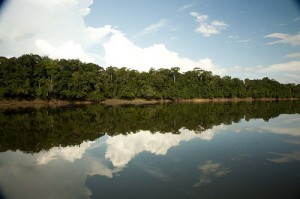Fabiola Ortiz
RIO DE JANEIRO, Jun 22 (TerraViva) – The countries of the Amazon river basin are pursuing definite goals for the region, such as zero deforestation by 2020, even though the Rio+20 conference’s outcome document does not include “sustainable development goals”.

The vast Amazon region needs sustainable development.
For the last three days, concluding this Friday Jun. 22, Rio de Janeiro has been hosting the United Nations Conference on Sustainable Development, or Rio+20. The final declaration prepared for signing by the participating heads of state has already been described as “weak” and “disappointing” by the U.N., official delegates and civil society representatives.
Claudio Maretti, the coordinator of the WWF Living Amazon Initiative, told IPS the Amazon Cooperation Treaty Organisation (ACTO) has the challenging task of agreeing common goals to replace the Millennium Development Goals (MDGs), which expire in 2015.
The MDGs are a set of global anti-poverty and development targets agreed in 2000 by the United Nations member states that include halving the proportion of people living in extreme poverty by 2015, from 1990 levels.
The eight Amazon countries – Bolivia, Brazil, Colombia, Ecuador, Guyana, Peru, Suriname and Venezuela – are worried that without measurable new targets the region may be overtaken by ecological disaster, which would reverberate around the planet.
“The primary need in the Amazon is the sustainable use of its resources, in order to avoid a collapse. It is possible to achieve zero deforestation by 2020, and maintain the region as a provider of services for humanity. There is still time,” said Maretti.
Twenty years ago, at the Earth Summit in Rio de Janeiro, Amazon countries spoke with a united voice at the inter-government meeting as well as at the parallel forum of social organisations.
One result of their combined effort was the presentation of a document titled “La Amazonia en pie” (roughly, Keep the Amazon Forest Standing), which analysed the reality of the megadiverse Amazon region, debunking many myths. The summary was written by Colombian Nobel Literature Prize-winner Gabriel García Márquez.
Two decades later, the WWF predicts that if current trends of deforestation and forest fires continue, the Amazon region will lose one-third of its vegetation by 2030.
Rainforest destruction may be exacerbated in the next 50 years, in which case the planet’s largest biome will shrink to less than 10 percent of its original forest cover by 2080, according to forecasts by the Global Biodiversity Outlook (GBO).
The Amazon jungle is the world’s largest tropical forest, covering six percent of the earth’s land surface and 40 percent of that of Latin America and the Caribbean.
This immense region is home to 38.7 million people, including 40 indigenous peoples who speak nearly 90 different languages.
The Colombian deputy minister for Environment and Sustainable Development, Adriana Soto, said that when the Rio+20 conference is over, the joint work of the Amazon countries will continue in earnest.
“We work with the Amazon countries in the framework of ACTO, learning from the experiences of each country and their ways of managing pressures from the expanding agricultural frontier and from illegal mining, one of the greatest threats we have in Colombia,” Soto told IPS.
According to Soto, the main causes of deforestation in the Colombian Amazon region are forest fires, illegal tree felling, cattle ranching and illegal mining, which is “as complex” as the illicit drug trade that goes on in the region. “In the case of Colombia, a large proportion of illegal mining revenues goes to financing illegal groups,” she said.
“We have a declaration (on sustainability) from the Amazonian peoples, and we are organising management models to make sustainable use of forest products, so that forest dwellers can meet their needs without deforestation,” Soto said.
Consolidación Amazónica (COAMA), an NGO that has been working for indigenous people’s land rights in Colombia for the past 20 years, along with other civil society organisations, is supporting sustainable development goals for the rainforest.
But COAMA representatives stress that the goals must take into account the specific cultures, and respect the traditional knowledge, of the Amazon forest peoples.
Anthropologist Martin von Hildebrand of the Gaia Amazonas Foundation, an organisation that is part of COAMA, emphasised the importance of reaching a consensus on sustainable goals with the indigenous peoples living in the Amazon regions of the eight countries.
“We support the fight against hunger and the struggle for gender equality and access to education and healthcare, but the goals must be set in consultation with the indigenous people,” he said.







 Add to Google
Add to Google







